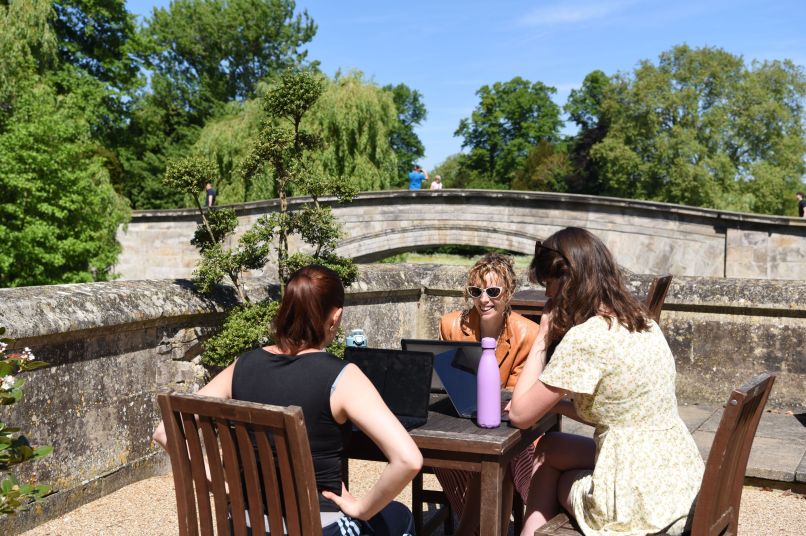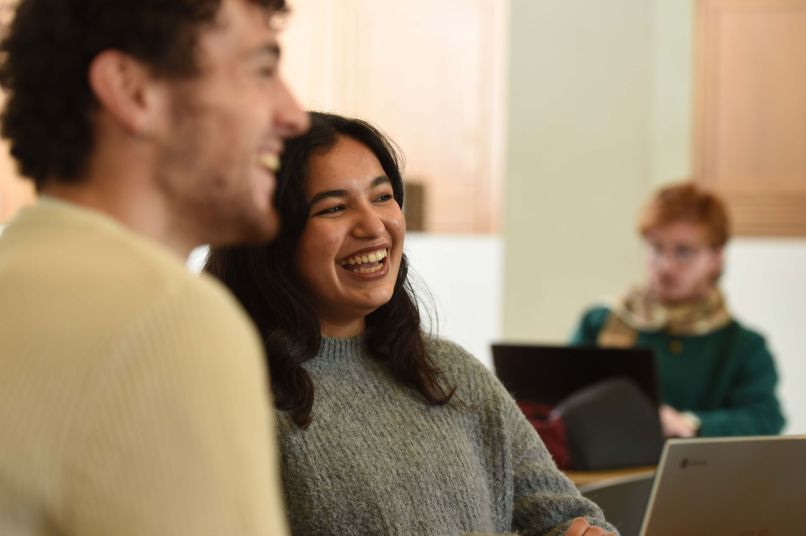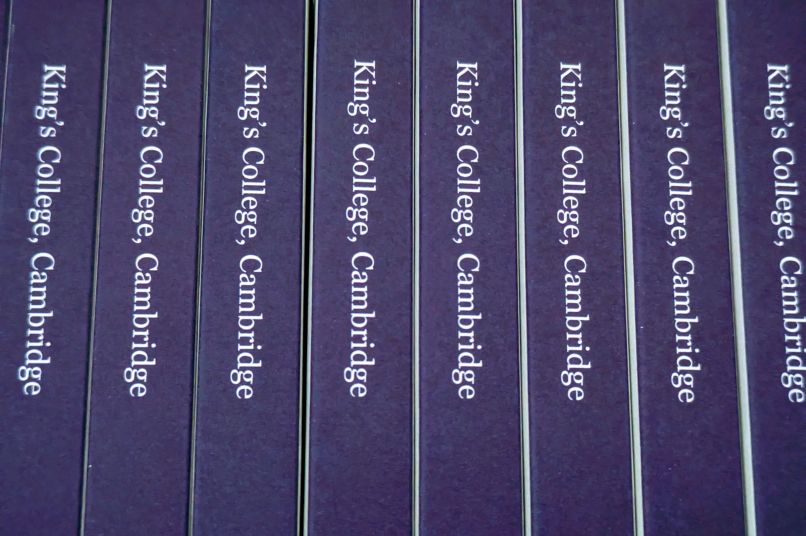Guidance for King's supervisors
Undergraduates at King’s are supervised by Fellows, academics, and postgraduate students from across the University. Anyone looking to find out more about supervision teaching at King's can use this section, or contact the Director of Studies in their subject of interest.

On this page

The College is very grateful to our supervisors for their efforts in this crucial aspect of Cambridge teaching and learning. So are our students, who are hugely appreciative of those who teach them.
This page is intended to supplement the generic intercollegiate guidance (Raven password required) and provide details that may be useful to you. Please do not hesitate to contact us if anything is unclear or if you have particular questions and we will do our best to answer quickly and clearly.
Practical information and contacts
Training
New supervisors must complete an online training module and attend an in-person workshop (or equivalent face-to-face training provided by their Department or Faculty). More information is available on the Cambridge Centre for Teaching and Learning website.
You can start supervising before you have completed the training, but please do make a booking for the course as soon as you can if you have not already completed it.
Payment for new supervisors who undertake the training is handled centrally by the Office of Intercollegiate Services and not by individual Colleges. Payments will be made through a bulk process after the submission and approval of reports. You need not claim for this payment. The payment covers the intercollegiate training. In the rare instances where a department may offer further training, any issues connected to payment should be referred to the Department and not to Colleges.
CamCORS (the supervision report system)
To submit supervision reports for your students and receive payment for these, you will need to register as a supervisor on CamCORS (Cambridge Colleges Online Reports for Supervisions). You can submit your registration application here, and the Tutorial & Academic Office will approve it.
When you register, you will be asked how you would like to get paid. For Fellows and those on a student visa, you must select ‘Pay via College payroll’. For everyone else, you will be paid direct to your UK bank account.
You can create supervision reports as soon as you start teaching. Any notes that you make will be private to you until you submit the report, when they can be seen by the DoS, Tutor and College. If the DoS releases the report it will then be available to the student.
The creation of a supervision report provides you with the name and crsid of any given pupil’s Director of Studies (DoS) and Tutor. You can also find details of DoSes on the college intranet here and Tutor’s here. If in any doubt as to which DoS to contact or if you need to be put in contact with a student’s Tutor, please email the Tutorial Office for further guidance. Please contact us if you have questions regarding the submission or processing of reports, queries about particular students you are supervising, what we expect in your subject or other matters.
Deadlines
Please make every effort to submit your reports each term at least a week before the end of Full Term. See the relevant University webpages for term dates. That timing allows Directors of Studies and Tutors to discuss reports in end-of-term meetings with students. Even if this means submitting a report before all supervisions have been conducted, we’d rather have the report available than nothing. Students appreciate this chance to discuss reports. The content can also inform planning for vacation study, revision or remedial effort. It is fine to submit a report that states some supervisions are yet to be given and a further report later, not claiming any additional hours.
We also ask Directors of Studies to approve supervision reports within a week of the end of Full Term. These arrangements allow payments to reach supervisors in the last week of December, March and June. We may run supplementary payments in late January, April and September if significant numbers of reports miss the earlier deadlines, but we cannot make ad hoc payments.
Supervisors on a student visa
If you are studying here on a student visa, it is essential that you have a contract with your College. If you are a kings student, please contact the financial tutor’s assistant, Nicky Wright (financial.tutor@kings.cam.ac.uk), who will make the necessary arrangements for you.
Working without a contract would contravene your visa conditions, so it is important that we complete the correct paperwork as soon as possible and ideally before your first supervision.
Booking a supervision room at King's
King's members can use CASC to book supervision rooms. If you are not a King's member but require a supervision room, please contact tutorial.office@kings.cam.ac.uk. Supervisors can also ask a King's student to make bookings on their behalf.
Payment rates
The following are the 2025-26 rates used by King's; they are based on the intercollegiate rate used between colleges when their employed staff or Fellows offer their supervision services for other colleges.
Per supervision:
- 1 student: £39.21
- 2 students: £46.68
- 3 students: £56.01
- 4 or more students: £65.35
The rate for a supervision includes preparation and marking as well as the actual supervision hour itself.

Our approach to supervisions
Our expectations
Our precise expectations about supervisions vary by Tripos, Tripos part and sometimes by individual student circumstances. Our core generic advice would be to facilitate student participation in supervisions and not to lecture them; to allow time for you to respond to students’ questions; and to respond to the particular needs of a given supervision group whilst not losing sight that the process is both an exploration of the subject and part of preparation for Tripos.
The University Teaching Review is considering ways of reducing student workload. We do not want either supervisors or students taking on more work than is necessary for the system to run smoothly and successfully. If in doubt, or if you have concerns that you may be running beyond such limits, please ask the relevant Director of Studies for guidance. Supervision work is not formally assessed and is always to be understood as formative. Students should understand that writing for supervisions is a form of learning and not a test.
In most cases you should already have been briefed by a Director of Studies about students’ names, contact details, any Student Support Document guidance, the number and frequency of supervisions we anticipate should be given, and the volume and the level of work we will require of the students you teach. Please do not vary from these expectations without first checking with the Director of Studies. Where the relationship is mediated through a departmental role, you may also need to consult course convenors and administrators as well as the relevant Director of Studies on some matters.
King's expects supervisions to be conducted during reasonable working hours. This might include supervisions being given at weekends, but should not include late night or very early morning teaching. If a supervisor thinks it is necessary to supervise outside the hours of 8am to 8pm, this must be discussed with the Director of Studies.
All supervisions are expected to be conducted in person, except in occasional circumstances where it becomes necessary e.g when someone is unwell, or a supervisor has to be out of Cambridge for other academic duties on a short term basis.
King's expects all its supervisors to act in accordance to the University's policy on staff student relationships, and for supervisors to declare all potential conflicts of interest to the Senior Tutor as soon as they arise.
Supervisor workload
The current payment methodology for those supervising undergraduates explicitly recognises that time is spent preparing to deliver a supervision. The total amount of work completed when supervising an undergraduate is considered for payment purposes to be just over twice as much as the number of supervisions delivered (i.e. a one hour supervision takes more than two hours of work).
Postgraduate research students are required by the University to limit their work to 6 – 10 hours per week (over and above their studies), and should in any case not work more than 20 hours each week. In order to follow University guidelines, postgraduate students should not deliver more than five supervisions in any one week. They should always consult with their supervisor before taking on any undergraduate supervision.
Serious academic, pastoral and welfare issues
If you have serious pastoral or academic concerns about the students you are teaching, please alert the Director of Studies promptly. We do not expect supervisors to take on the duties which Directors of Studies, the College Nurse and the Tutors provide in managing serious academic or pastoral / wellbeing concerns. Please refer all such matters to us rather than seeking to deal with them yourself.
Nor do we expect (let alone encourage) supervisors to accede if a student suggests that they wish to tell them something in total confidence, not for onward transmission to others. You may wish to report any such request informally to a member of our welfare team such as the Tutor or Senior Tutor. It is often a sign that a student needs additional support. Supervisors are not expected to become pastoral advisors to students. Their role is an academic one.
Study support beyond supervisions
If you become aware of a study skills need which goes beyond the specifics of your topic you should also contact the Director of Studies. King’s does have access to a study skills expert so additional help might be available.
Supervision reports
Supervision reports should be thought of primarily as feeding back to the College (DoS and Tutor) on a student’s work during the term. Once they have been released by the DoS they are visible to the student and thus can be used to reinforce feedback that has been given in writing or in supervisions. Reports are discussed at end-of-term meetings and help us properly to support and advise students. Reports should be realistic even if that may be discouraging to the student.
The College values an effective assessment, even a brief one, of a student’s strengths and weaknesses; aptitude, attitude and progress; their work rate and their participation. Constructive but clear reports are particularly useful when things go wrong for a student. All supervision reports must be submitted as part of any case made to the Examination Access and Mitigation Committee (EAMC, the University body that considers applications for allowances, intermissions, etc.). That body draws on supervision reports to understand the student’s level of effort, engagement and aptitude.
A report is used in several ways:
- It informs DoS and Tutorial conversations with students regarding their attendance, commitment, participation, and achievements in supervisions.
- It assists in steering students on how to work efficiently rather than too hard, too little or with the wrong focus.
- It helps students to see an assessment of their work and locate their progress in the wider context of their whole course. It also assists in planning revision, consolidating work or honing study skills.
- Where a student may be struggling personally or academically, reports provide invaluable detail. Discussions of capability to study are enhanced by reports that give an early clear and balanced account of how a student has been doing.
- It helps us to manage students’ expectations. Tutors and Directors of Studies may also feed in material based upon supervision reports when they write references. These are greatly enhanced by the ability to refer to supervisors’ views. References are sometimes requested years after graduation and being able to feed in material from reports is especially helpful when this occurs. Please note that supervisors are not required to provide personal or academic references for students. Occasionally a supervisor may well be happy to provide a reference, perhaps especially if it relates to dissertation work. That is fine and may be very much in the student’s interest. However, please do not feel obliged to do this and do feel free to liaise with the student’s DoS if approached.
Multiple supervision reports from one supervisor are not better than single ones. Even if you use draft reports as an aide-memoire with detailed accounts of supervisions, please do not submit separate reports on every supervision. It is preferable to have a single report that summarises the student’s strengths and weaknesses and makes suggestions on how they can best consolidate and improve their work.
If you feel there is a need to write at greater length, please email the Director of Studies and/or Tutor via the links provided on the report form.

Duties and policies
If you have any questions about supervision or College policies, please contact the registrar.
Common questions
Do I have to complete the fields on industry, progress, interest and estimate of work?
Yes, please. These are very important to Directors of Studies and Tutors and often are simply vital in mitigation or disciplinary processes. For ‘estimate of work’ give an honest assessment of the quality of the work actually done so far, rather than an optimistic evaluation of how well the student might possibly do if all goes as well as possible.
What should I do if a student persistently misses supervisions or fails to hand in work?
Supervisors should establish clear expectation on attendance at the start of term, notably if their own commitments limit their flexibility to rearrange supervisions. Guidance to students on this topic stresses that attendance at supervisions and completing work for them is mandatory, not optional.
At their induction we warn students that to miss supervisions without good cause and/or without reasonable advance notice to the supervisor and other students in their supervision group is not acceptable. Good cause would include illness, serious personal or family issues, Faculty commitments, job or HE interviews (for finalists), and such like. Extra-curricular activities would not usually be regarded as constituting just cause.
Please treat failure to attend as you would any other serious academic or pastoral concerns. Let the DoS know immediately if a student misses even one supervision. It can be an important early indicator that we need to put extra support in place for them.
How honestly critical should I be in writing a report? How much should I sugar-coat?
The College would like you to be as honest as possible whilst balancing positive and negative commentary. Mention what has been done well as well as areas for improvement. Open and clearly evidenced realistic reports are important in helping students to learn, grow and improve their performance. Directors of Studies will have the opportunity to read reports before they discuss them with students and release them. Before their end-of-term meetings they may contact you to discuss your report if it raises concerns. If you are hesitant about what to include or the tone of your report, please contact the DoS or Tutor.
I think a student could benefit from some extra tuition. How should I proceed?
Like all the Colleges, Kings normally operates within the agreed supervision norms and guidance on group sizes. However, there routinely are cases where those involved in teaching a student feel that that student could benefit from some variation on the norms. This may emerge from an SpLD assessment or Student Support Document produced by the ADRC, or through other routes. If you think a student may need some remedial additional teaching, please contact their DoS. We would not expect you to put in additional time and effort without the DoS’s agreement and, if that goes beyond the norms, that of the Senior Tutor.
